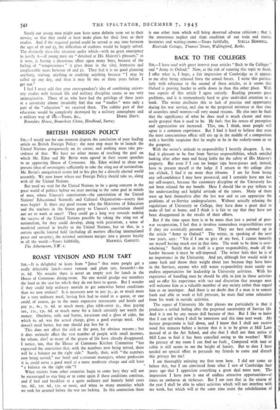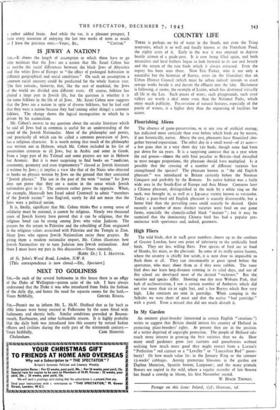BACK TO THE COLLEGES
have read with great interest your articles "Back to the Colleges" and "Army to Oxford." Now, at the risk of running this topic to death, I offer what is, I hope, a fair impression of Cambridge as it appears to me after being released from the armed forces. I write this particu- larly with reference to the second of these articles, as it seems that Oxford is proving harder to settle down in than this other place. With two aspects of this article I agree entirely. Reading presents great problems, and it is tremendously hard to give undivided attention to a book. The writer attributes this to lack of practice and opportunity during his war service, and also to the perpetual existence at that time of countless small worries—all very sound reasons. He also says he finds that the significance of what he does read is much clearer and more easily grasped than it used to be. He feels that his senses of perception and appreciation are increased. This, too, I think, most people will agree is a common experience. But I find it hard to believe that even the most conscientious officer still sits up in the middle of a composition with a horrible suspicion that he ought to be in the orderly-room or on the gangway.
With the writer's attitude to responsibility I heartily disagree. I, too, find it pleasant to be free from Service responsibilities, which entailed looking after other men and being liable for the safety of His Majesty's property. But even if I can no longer sign leave-passes and, instead, have to present myself at the lodge if I return to the college after ten o'clock, I find it no more than irksome. I am far from losing any self-confidence I may have possessed, and I certainly have not lost my self-respect, because the customary discipline of the University has not been relaxed for my benefit. Here I should like to pay tribute to the understanding and helpful attitude of the tutors. Many of them were up here themselves after the last war and so can appreciate the problems of ex-Service undergraduates. Without actually relaxing the regulations of University or College, they have done a great deal to make ut feel at home, and I think it is fair to say that they have not been disappointed in the results of their efforts.
But if the time spent here is to be more than just a period of post- war recuperation, I feel that it involves tremendous responsibilities even if they are essentially personal ones. They are best summed up in the article "Army to Oxford." The writer, in speaking of the next two years, says: "Yet if I am to give of my best, I cannot honestly see myself having much rest in that time. The work to be done is over- whelming." Surely that in itself is a great responsibility, made all the harder because it must be self-imposed. The writer feels that he is of no importance in the University. And yet, although few would wish to come back and throw their weight about just because thgy have been in the Services, anyone who still wants responsibility must surely see endless opportunities for leadership in University activities. With his experience of handling men he should be able to join in those activities and so offer his experience with tact and discretion that younger men will welcome him as a valuable member of any society rather than regard him as an interloper. And there is no doubt that if a man is to remain fresh and able to work at full pressure, he must find some relaxation from his work in outside activities.
The aspect of University life that pleases me particularly is that it produces a settled feeling after the perpetual uncertainty of Service life. And it is not by any means dull because of that. But I like to kneow that I can tell where I shall be tomorrow and this time next week. My lecture programme is laid down, and I know that I shall not receive word five minutes before a lecture that it is to be given at Mill Lane instead of at the Art School, and also that I shall not then arrive at Mill Lane to find it has been cancelled owing to the weather! With the privacy of my room I can find no fault., Compared with tent or cabin it still seems to me the height of luxury. But to date I have needed no special effort to persuade my friends to come and disturb this privacy for me!
I am thoroughly enjoying my first term here. I did not come up before this, but I am convinced from what I saw of Cambridge four years ago that I appreciate everything a great deal more now. The impression I have now is one of endless attractive opportunities—at times an embarTas de richesses. But I am sure that in the course of the year I shall be able to select activities which will not interfere with my work, but which will at the same time assist the rehabilitation of 3 rather addled brain. And while the vac. is a pleasant prospect, I have every intention of enjoying the last two weeks of term as much































 Previous page
Previous page